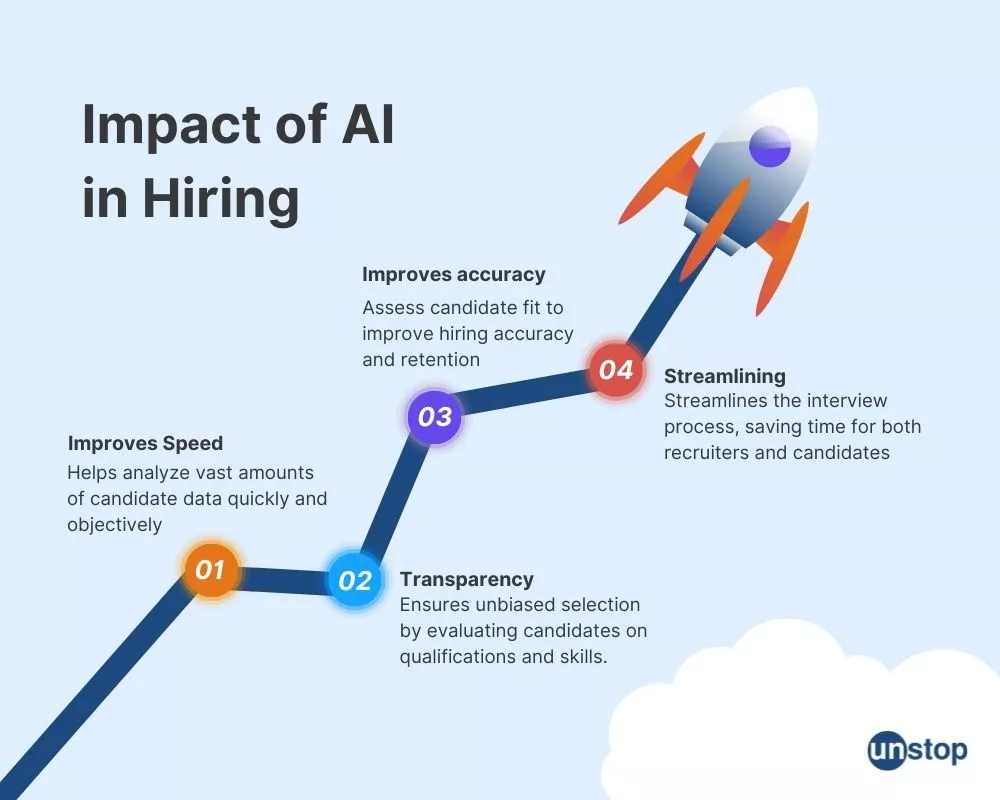Tech Job Market Predictions 2024
The tech job market in 2024 is poised for significant shifts driven by emerging technologies and evolving business needs. Companies are expected to ramp up hiring in several key areas, reflecting the growing demand for skilled professionals who can navigate the complexities of digital transformation. Key job roles set to see a surge include:
- Artificial Intelligence and Machine Learning Specialists
- Cybersecurity Experts
- Data Scientists and Analysts
- Cloud Infrastructure Engineers
- Software Developers with Agile Methodologies
The emphasis will be on professionals who bring a blend of technical expertise and practical experience, aligning with future-focused business strategies and innovation goals.
1. Impact of AI and Machine Learning on Hiring
AI and Machine Learning are revolutionizing the hiring process by increasing efficiency and reducing biases. Companies are integrating AI-driven tools to screen resumes, conduct initial interviews, and provide predictive analytics for candidate success.
This technology helps in identifying skill gaps and suggests training programs. Recruiters benefit from reduced time-to-hire and enhanced quality of hire. Machine learning algorithms are used to match job seekers with roles that fit their skills and experiences precisely. Consequently, these advancements are reshaping traditional recruitment, making it more objective, data-driven, and streamlined.

Image Source: Unstop
2. Remote Work: A Permanent Shift?
Remote work has evolved into a mainstay in the professional landscape, no longer confined to temporary pandemic measures. Companies increasingly recognize its potential for cost reduction and access to a global talent pool. A shift towards a hybrid work model is evident, combining in-office presence with remote flexibility. Key benefits include:
- Reduction in overhead costs
- Enhanced employee satisfaction and productivity
- Broader talent acquisition
Technological advances support this shift, with tools enhancing collaboration and communication. Industry trends indicate that remote work options will remain a critical factor in job offerings and employee retention strategies.

Image Source: PRNewswire
3. Cybersecurity Demand: A Growing Necessity
The demand for cybersecurity professionals continues to surge as cyber threats grow more sophisticated and frequent. Organizations across all sectors prioritize hiring cybersecurity experts to safeguard sensitive data and maintain system integrity. Key roles experiencing heightened demand include:
- Security Analysts
- Penetration Testers
- Cybersecurity Engineers
In addition, the rise of remote work has further amplified the need for robust cybersecurity strategies, driving companies to invest in talent capable of fortifying their digital perimeters. Emerging technologies such as AI and IoT also contribute to the growing necessity for advanced cybersecurity measures and skilled practitioners.
4. The Rise of Data Science and Analytics Roles
The surge in data generation and the need for actionable insights have elevated data science and analytics to an indispensable part of modern businesses. In 2024, organizations are expected to increase their hiring of:
- Data Scientists
- Data Analysts
- Machine Learning Engineers
- Business Intelligence Analysts
These roles are crucial in transforming raw data into strategic assets. Companies across sectors, from finance to healthcare, are investing heavily in data-driven decision-making processes. As a result, skills in Python, R, SQL, and machine learning algorithms are becoming highly sought-after skills. This trend underscores the critical importance of data proficiency in the evolving job market.

Image Source: Northeastern University
5. Software Development: Expectations and Growth
Software development job market predictions 2024 is anticipated to witness a substantial evolution, driven by the integration of emerging technologies. Companies are expected to value expertise in:
- AI and Machine Learning: Developers skilled in these domains will be in high demand as businesses strive to innovate.
- Cybersecurity: With rising cyber threats, developers proficient in securing systems will see growing opportunities.
- Cloud Computing: As more businesses migrate to the cloud, proficiency in platforms like AWS and Azure will be crucial.
Moreover, adaptability and continuous learning will be essential, given the industry’s rapid technological advancements.
6. UX/UI Design: Enhancing User Experiences
In 2024, the demand for UX/UI designers is anticipated to soar as companies prioritize user-centric digital experiences. With rising competition in digital markets, businesses seek professionals adept in creating intuitive and visually appealing interfaces.
Key skills in demand include proficiency in design software like Sketch and Adobe XD, a strong grasp of user research, and the ability to prototype and test effectively. A focus on mobile-first design and accessibility will be critical. Incorporating feedback loops to iterate designs quickly and improve user satisfaction will also be a pivotal element of successful UX/UI strategies.
7. Cloud Computing: New Opportunities Emerging
Cloud computing is transforming industries, leading to substantial job growth in 2024. Companies increasingly seek professionals skilled in cloud infrastructure, such as AWS, Azure, and Google Cloud Platform. Key roles witnessing a surge include cloud architects, engineers, and security specialists.
The demand for these experts is driven by the need for scalable, cost-effective IT solutions and enhanced data security. Hybrid and multi-cloud strategies further expand opportunities. Certifications in cloud technologies are becoming critical credentials. Professionals can expect competitive salaries and career advancements as businesses continuously migrate to cloud-based solutions.
8. Gig Economy and Freelancing in Tech
The gig economy continues its aggressive evolution within the tech sector, driven by rising demand for flexible, specialized skills. Tech professionals increasingly opt for freelance positions over traditional employment due to better work-life balance and variety in project opportunities. Companies benefit from this shift as well by accessing a diverse talent pool without long-term commitments. Key areas experiencing significant growth in freelance opportunities include:
- Software development
- Cybersecurity
- Data science
- UI/UX design
Platforms like Upwork, Fiverr, and Toptal streamline the connection between freelancers and employers, ensuring a dynamic and rapidly adaptive employment landscape.
Diversity and Inclusion: Shaping Hiring Practices
In 2024, diversity and inclusion will remain a cornerstone of hiring practices. Companies are expected to implement more comprehensive strategies to attract and retain talent from various backgrounds. Efforts include:
- Broadening job postings to appeal to diverse candidates.
- Providing bias training for hiring managers.
- Offering inclusive benefits that cater to different needs.
These practices not only enhance team dynamics but also drive innovation and company growth. Organizations that actively promote diversity and inclusion will likely see higher employee satisfaction and a stronger reputation in the competitive job market.

Image Source: Careerplug
Why Continuous Learning and Upskilling Matters
The rapid pace of technological advancements necessitates that professionals continually update their skill sets to remain competitive. The emergence of AI, machine learning, and blockchain technologies demands that employees not only master new technical skills but also refine soft skills such as adaptability and problem-solving.
Companies are increasingly prioritizing candidates who demonstrate a commitment to lifelong learning and offer robust training programs to facilitate this. Online learning platforms and certification courses are becoming key resources where professionals can acquire and validate new competencies quickly, ensuring their skills stay relevant in a dynamic job market.

Image Source: Intrepid
How Global Economic Factors Shape Tech Hiring?
Global economic factors significantly impact tech hiring trends. Economic stability and growth spur investment in technology, increasing demand for tech talent. Conversely, economic downturns lead to budget cuts and hiring freezes. Exchange rates affect the cost of hiring foreign talent, influencing global recruitment strategies.
Trade policies and tariffs can either hamper or enhance the hiring of skilled workers from specific regions. Government regulations and fiscal policies also play a crucial role. For companies, navigating these economic variables is essential for maintaining a competitive edge and ensuring a steady pipeline of talent.
Adapting to New Technologies
As companies integrate cutting-edge technologies like artificial intelligence, machine learning, and blockchain into their operations, employees must adapt swiftly to stay relevant. This shift necessitates upskilling through:
- Specialized training programs
- Online courses
- Workshops
Industries such as healthcare, finance, and logistics, in particular, are seeing rapid technological advancements. Employers prioritize candidates who show adaptability and a proactive approach to learning. Soft skills like critical thinking and problem-solving are as essential as technical proficiency. By fostering a culture of continuous learning, organizations can ensure that their workforce remains competent and competitive in an ever-evolving job market.
The Future of Work: Job Opportunities in Tech Startups
Tech startups in 2024 are expected to create groundbreaking job opportunities. These roles will often focus on cutting-edge technologies and innovative solutions. Job seekers can anticipate positions in:
- Artificial Intelligence (AI) development
- Robotics engineering
- Blockchain technology
- Advanced cybersecurity
Individuals hired by these startups will need to adapt quickly and bring fresh ideas to the table. The dynamic and fast-paced nature of these environments will attract those eager to make a substantial impact. Professionals can expect competitive salaries, equity options, and flexible working conditions. This trend underscores the critical role startups play in technological advancement.
Conclusion
The dynamic tech landscape of 2024 highlights the need for precise job market insights. From AI-driven roles to data-centric positions, staying updated is crucial.
Looking to transform your hiring strategy and make the best of the tech hiring trends and job market predictions 2024? Leverage JobsPikr for powerful data-driven decisions. Sign up today!



